*Relax, this mistake is made on purpose
Imagine you’re telling a friend a horror story from your childhood.
You just get to the best part when suddenly they interrupt, saying “The ghost and I,” not “Me and the ghost.”
Was your friend actually right? And if the sentence is still understandable, does it even matter?
Well, we all have at least one “Grammar Police” acquaintance who is annoyingly waving all the errors right in our faces.
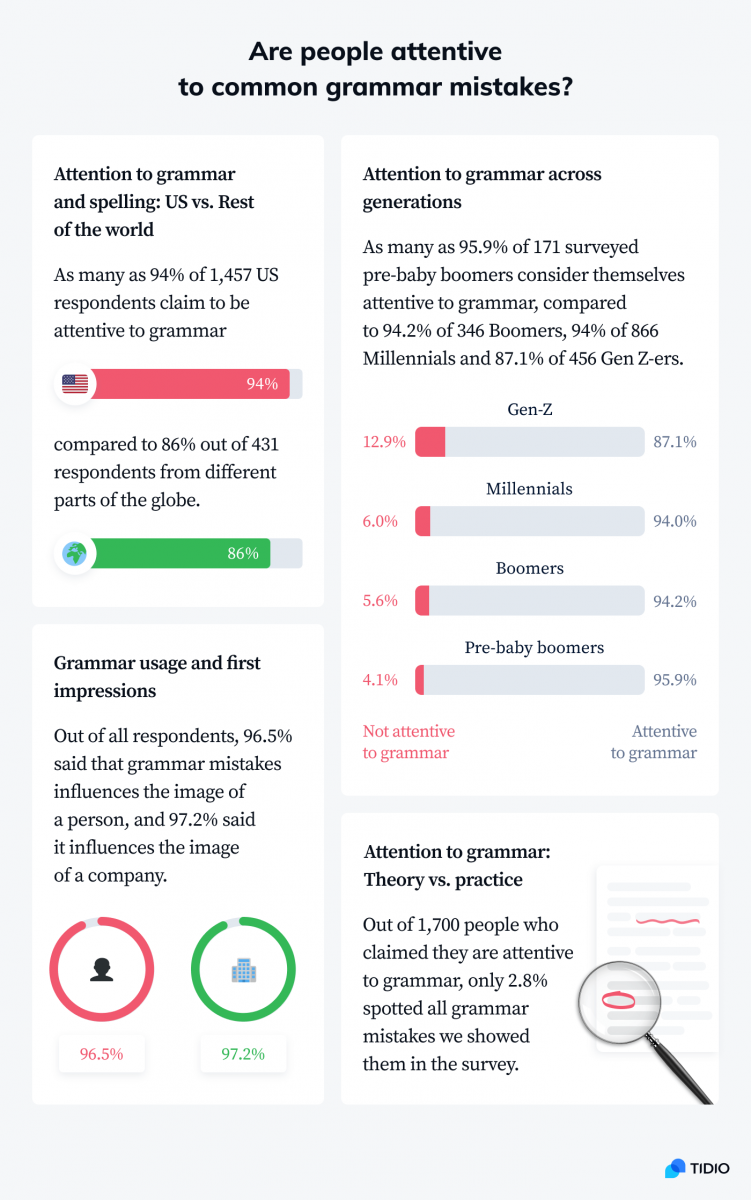
But then again… who didn’t wince at least once, looking at some obvious grammar mistakes while scrolling the comments on YouTube, or reading a blog?
In fact, we decided to have a closer look at the subject and surveyed 1,839 people to see to which extent they are attentive to grammar. And which grammar errors are truly cringeworthy.
Here’s what we learned:
- As many as 94% of 1,457 US respondents consider themselves attentive to grammar and spelling when they browse or read online content, compared to 86% out of 431 respondents from different parts of the globe.
- When it comes to age, pre-baby boomers consider themselves the most attentive to grammar (95.5% said so), but also the Millennial generation considers themselves very grammatically conscious. As many as 94% of Millennial respondents admitting they pay attention to grammar and spelling mistakes. This stands against common belief that Millennials and Gen Z-ers are clueless about grammar because of the ever-present “texting culture” that includes using abbreviations and emojis instead of elaborate descriptions (such as the famous “shrug emoji”).
- At the same time, 96.5% of all respondents admit that grammar mistakes influence the image of a person, and 97.2% claim that it affects the perception of a company
- Out of 1,700 people who admitted they consider themselves attentive to grammar when reading content online, only 2.8% spotted all grammar and spelling mistakes we showed them in selected text samples.
Do you find it surprising? There’s more—
Let’s dive right in!
Why does grammar have such an impact on people?
It turns out that the subject goes deeper than I thought.
According to Andrea S. Calude, written language was standardized according to a singular spoken variety, coming from people in power. What followed was a situation in which patterns that deviated from rules were considered corruptions or signs of low social status.
Nowadays, language evolution happens so quickly that people don’t have the chance to adapt to the changes. New expressions and neologisms appear almost daily and only some of them stay with us permanently, Druide report finds.
Could you imagine saying something like “I’m unfollowing you” or “I’m unliking your post” 15 years ago? Neither of them would make sense both in terms of grammar and meaning, but today, both these expressions are hard-coded into the digital vernacular.
While this illustrates that we accept certain novelties into our everyday language, we have a long history of linking grammar to intelligence and status nonetheless. Does it mean that we consider people making grammatical mistakes dumb?
Let’s find out.
How do common grammar mistakes influence people’s opinion of you and your company?
As many as 44.4% of respondents admit your grammar reflects your intelligence. About 20.9% of respondents think it reflects your education level.
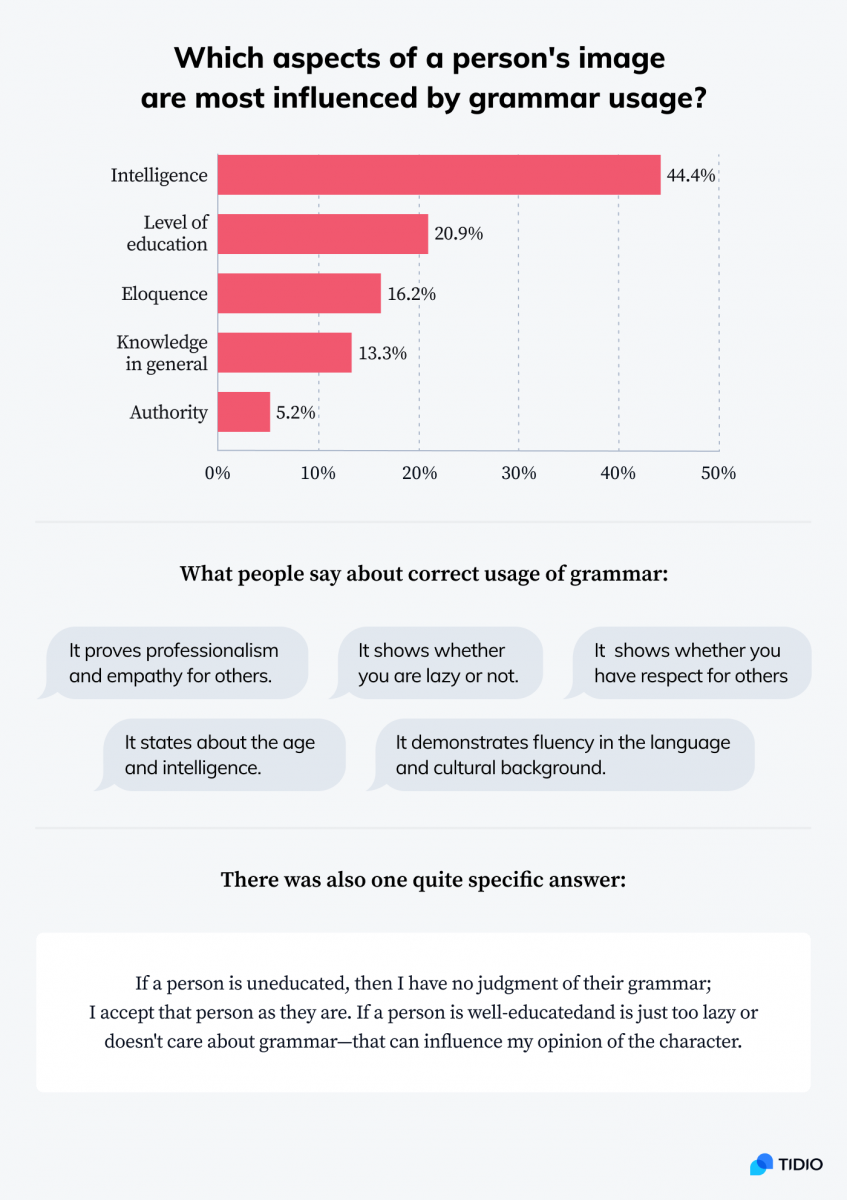
Additionally, one person from our sample on Reddit said this:
It’s crazy how my opinion on someone can do a 180° based on their grammatical and spelling mistakes. You write “you’re” instead of “your” more than once, and it’ll take a lot for me not to see you as dumb.
Reddit user
Also, commas. I’m not going to sit here and pretend I know all the comma rules, but holy sh#t! Some people write entire paragraphs without a single comma. The voice in my head reads that like a babbling baby.
Nobody doubts there is a significant relationship between grammar and thought. However, it was proven in a Current Biology study (qtd. in Bloom) that even people with a linguistic impairment are capable of abstract and complex reasoning, which disproves the theory that proper grammar = intelligence.
This doesn’t change the general outlook on how people perceive those making grammar mistakes as “lazy” or “uneducated,” especially in the professional setting. Kyle Wiens, the CEO of iFixit, said that “he won’t hire people who have bad grammar” and gives all of his job applicants a grammar test, as quoted in the study by Nicole Frederick.
And if you think people judge others quite harshly when it comes to grammar mistakes, it turns out that the company’s whole image can be shattered to pieces because of incorrect use of grammar.
A whopping 51.8% of respondents admit that grammar mistakes can ruin a company’s professional image, and 34.9% answered that a company’s credibility could be affected by grammatical errors.
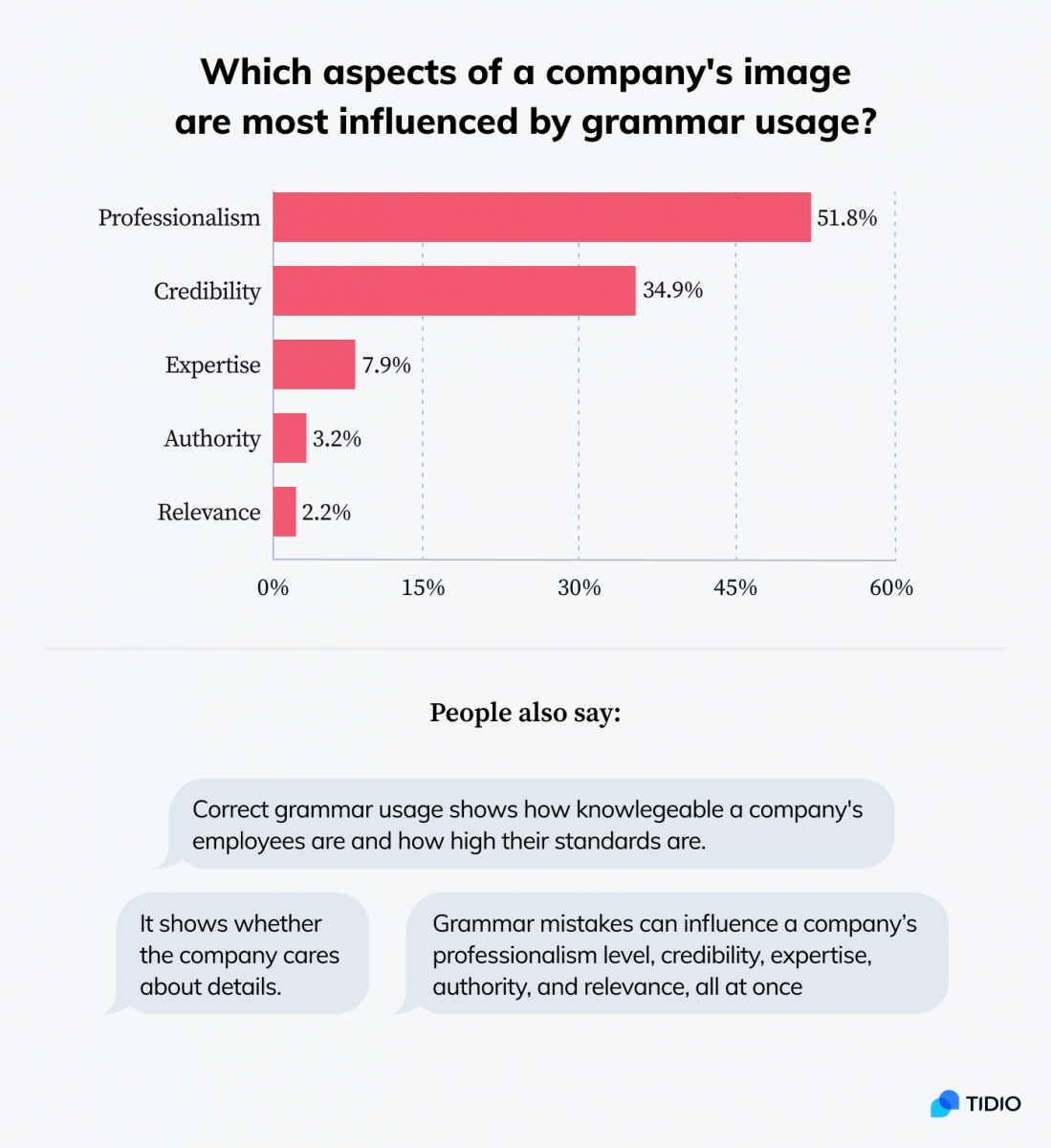
When you think about it for a second, it all makes sense. A visit to your company’s landing page is usually the first interaction a prospective customer will have with your brand.
If the landing page they are visiting is full of grammar and spelling errors, they may simply doubt whether you are to be trusted. If you don’t care about your online presence, why should they choose you over a more “professional” competitor?
And while Boland and Queen have proven that judging a person by their grammar says more about you than them, some mistakes are best to avoid.
What are some of these glaring grammar mistakes one can make? Let’s find out.
The most annoying common grammar mistakes
There are many online articles discussing the most common grammar errors. But the commonality of these mistakes is one thing and how people actually perceive such errors is another.
This is exactly what we wanted to have a look at!
That’s why in the second part of our survey, we chose a few common grammar or spelling mistakes and asked our respondents how irritating they are.
Let’s have a look.
#1: Their vs. They’re vs. There
You know the difference between the three: contraction (they’re), possessive (their), adverb (there).

Out of all respondents, 80.1% said there’s something wrong with our text sample presented below, and 90.5% of the group actually spotted the mistake.
Furthermore, 85.71% of those who did, admitted they find it irritating.
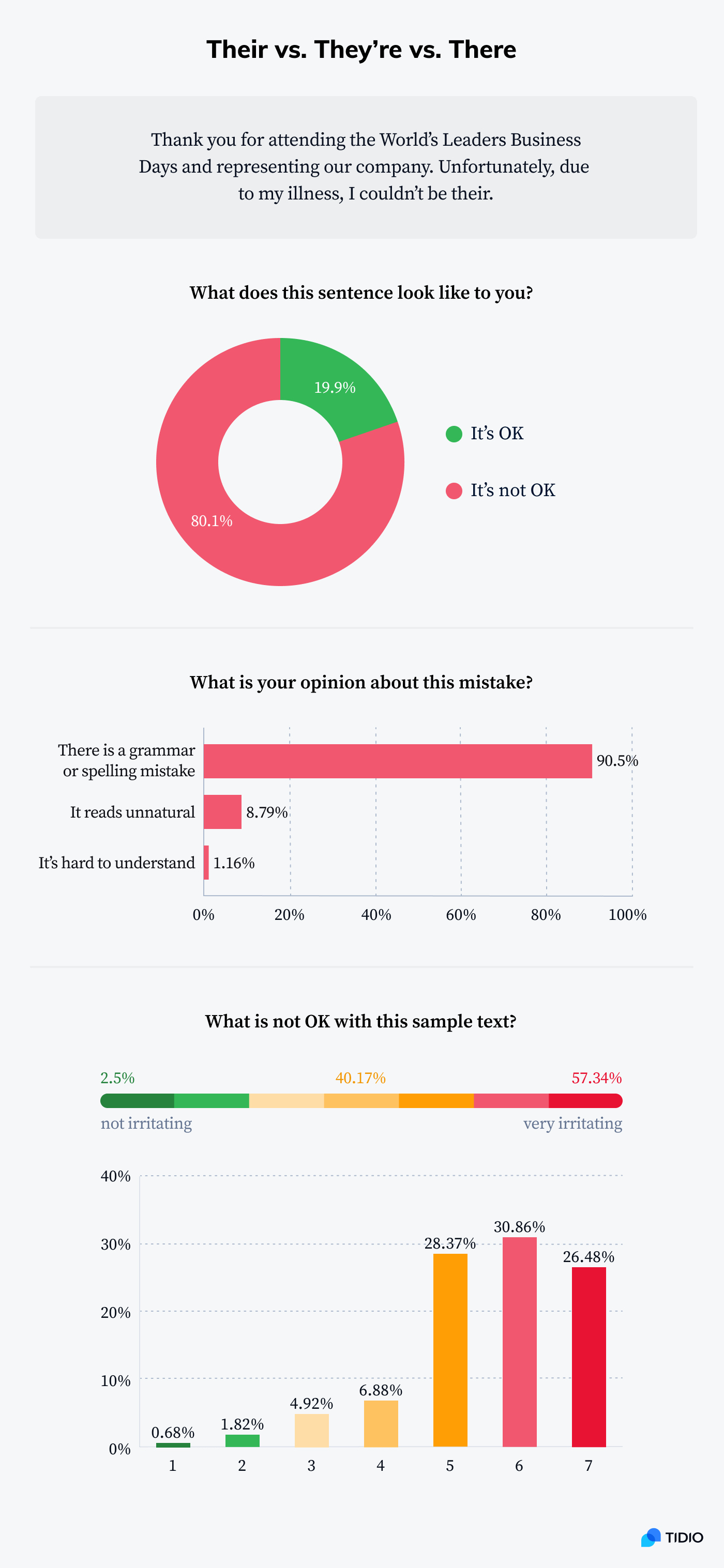
Their opinions? If you write “their” instead of “there,” you are most probably careless (53.1%), uneducated (22.4%), or incompetent (20.7%).
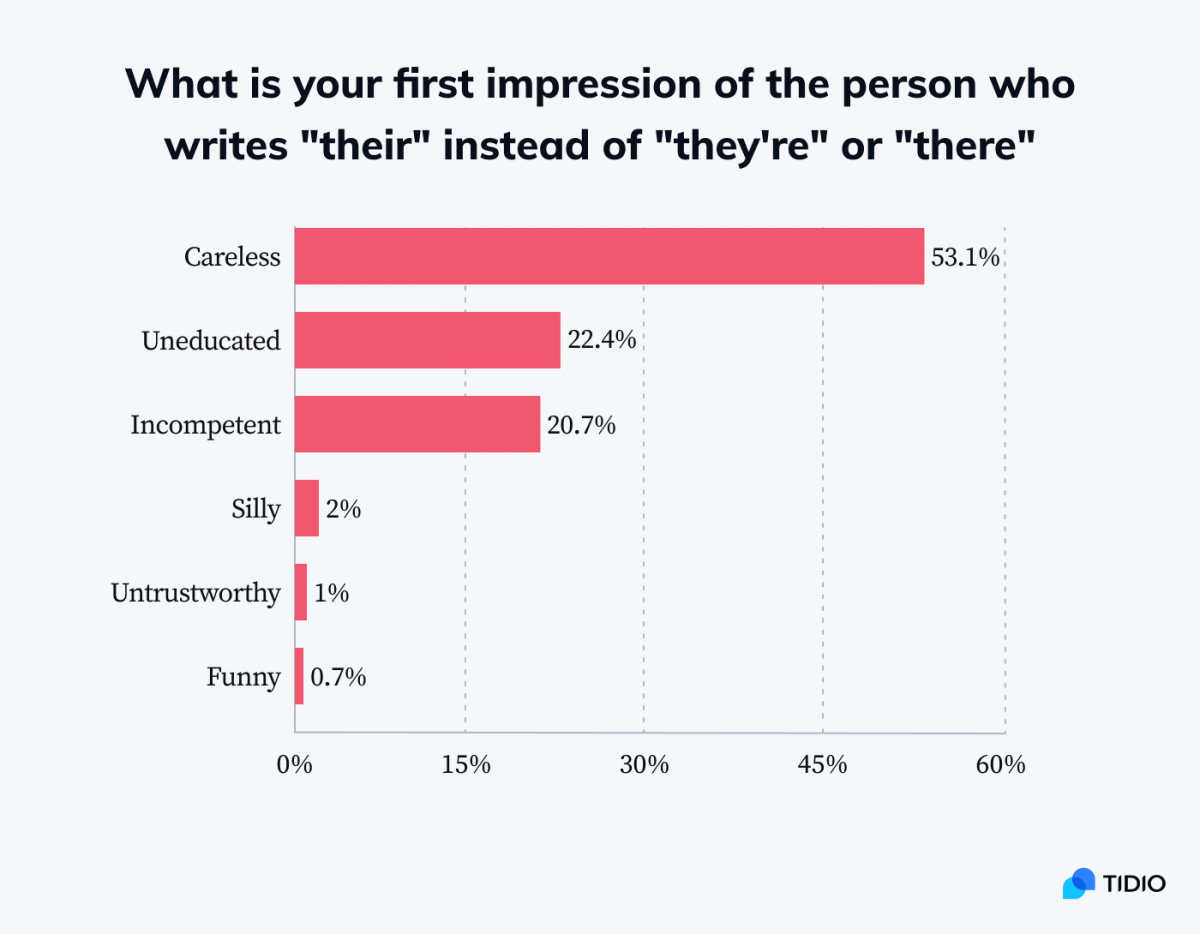
Some respondents admitted that the person making such a mistake sounds “dumb,” “unprofessional,” and “ignorant” among “sloppy” and “clumsy.” Ouch.
On a more positive note, some people said that people who would make such a mistake “are probably not native English speakers” or the error could be blamed on “autocorrect, which happens all the time.”
#2: Your vs. You’re
It seems that one of our respondents quoted above is not alone in her stand on the “your” (possessive) vs. “you’re” (contraction from “you are”) mistake.
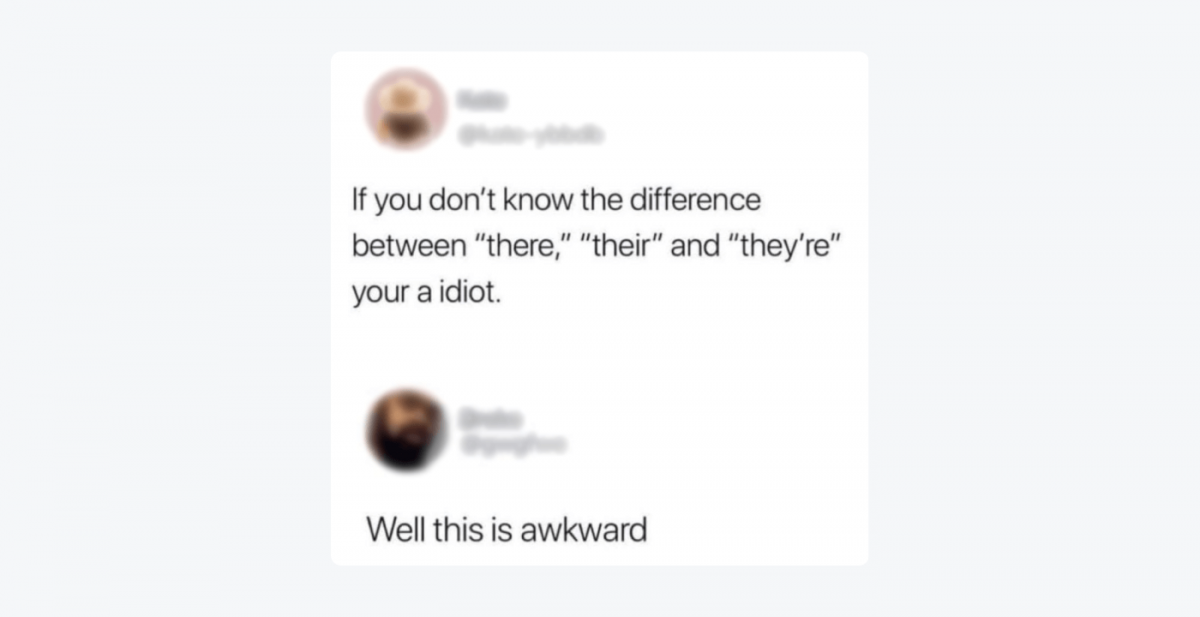
As many as 76.7% of respondents noticed that something is not ok with the sample sentence, and 92.53% of them actually spotted the error. Out of this group, 85.16% rated this mistake as irritating or highly irritating.
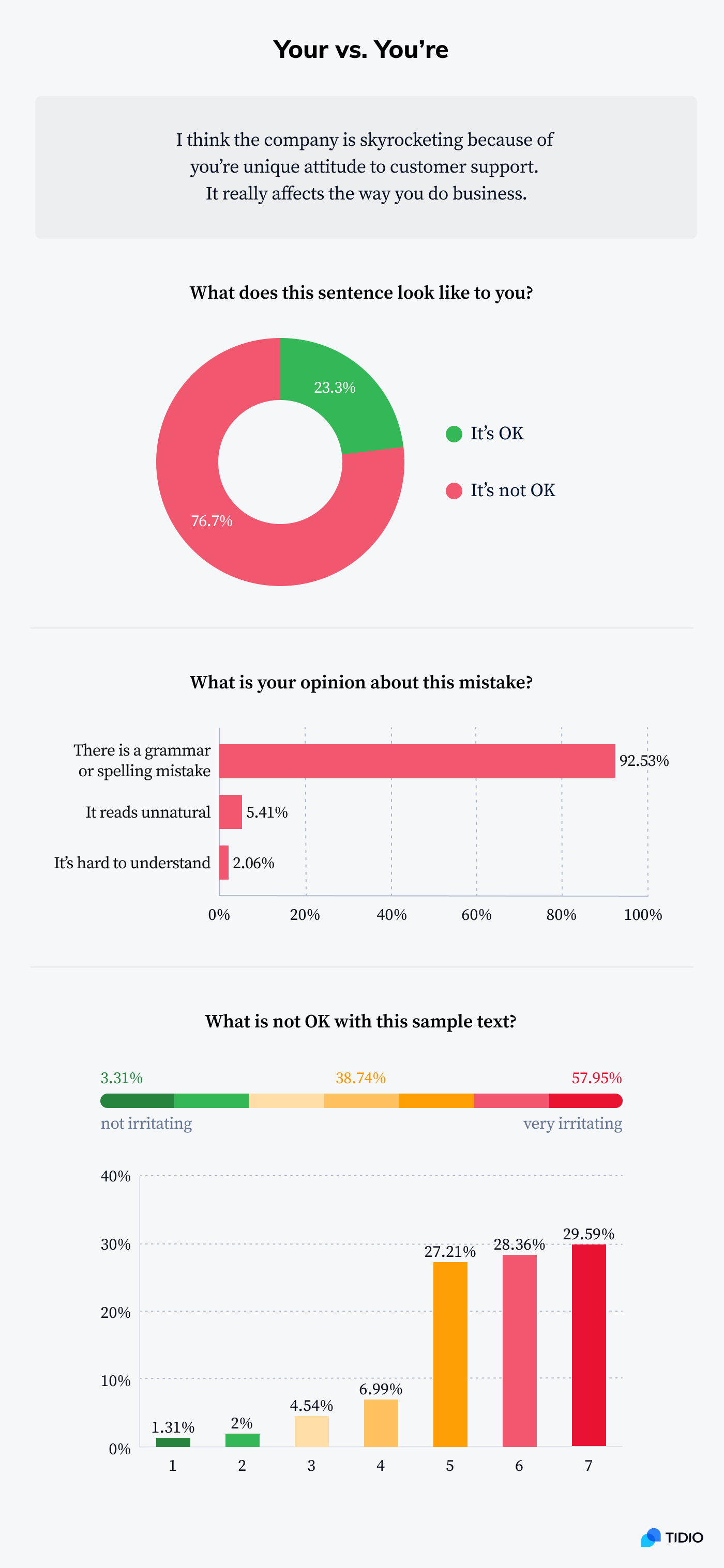
What is interesting—
Even though respondents agreed that the mistake is irritating, they also claimed that the person “just didn’t proofread” was “clumsy,” or “they are just not good with contractions.”
#3. Less vs. Fewer
According to the English grammar rules, “fewer” is used with countable nouns (like people) and “less” with uncountable nouns (like water).

Although grammar professors would strongly object, “less people” is widely used in casual conversations. Some native speakers say that because this expression is so present, they don’t even realize it’s an actual error.

In our survey, as many as 68.8% of respondents saw that there is something wrong with the sample text, and nearly half of them noticed the error (47.05%). Out of this group, 52.18% considered this mistake irritating.
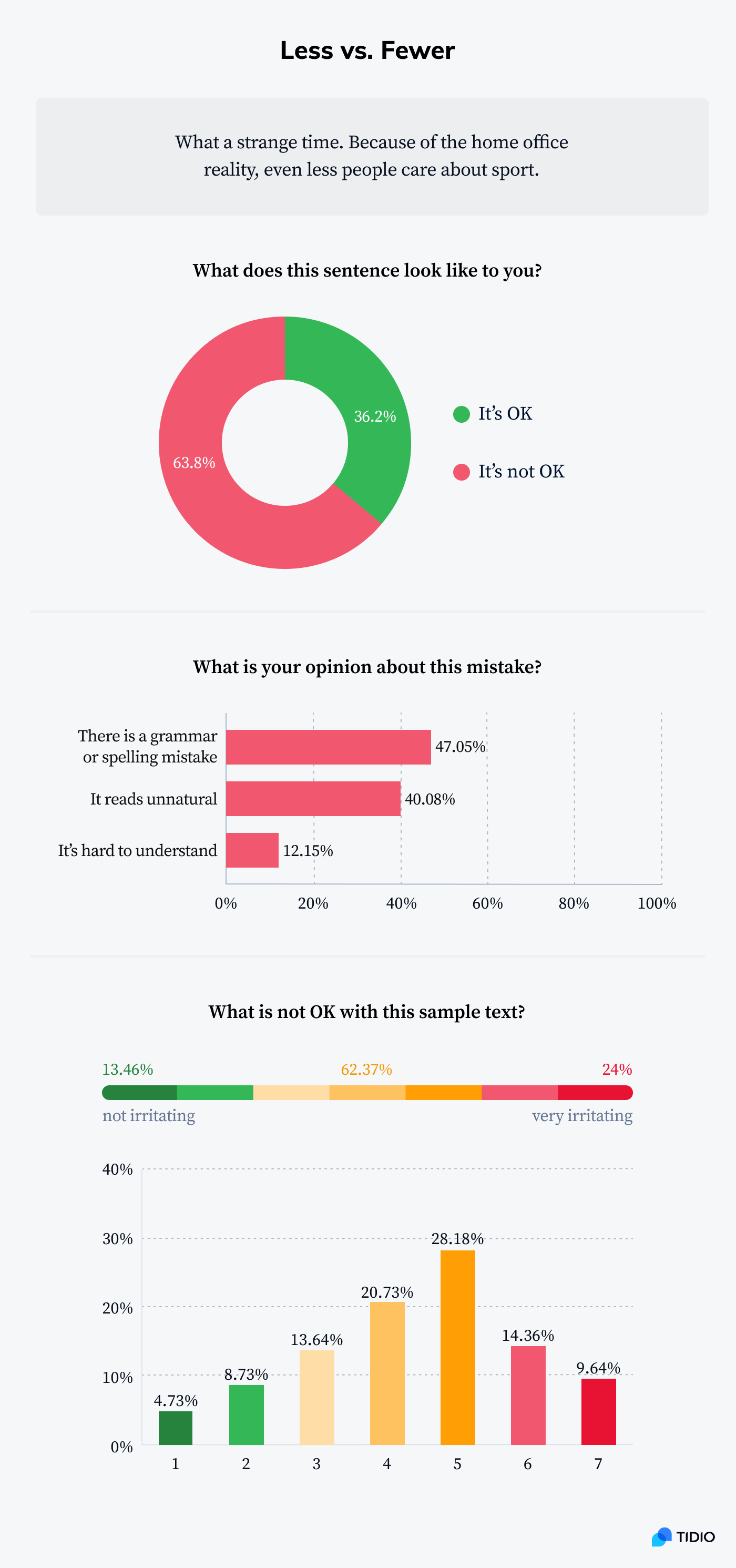
When asked about the opinion about the person who would make such a mistake, respondents said: “It’s a pretty common mistake, and I don’t think they’re particularly careless or uneducated. It might just be something they see other people use wrong and just assume it’s right.”
or
“It’s a common mistake, and sometimes I find that “fewer” sounds clunkier than “less.”
And even though some respondents answered, “This person is uneducated; should be “fewer,” it seems that as language evolves, some grammar errors are more widely accepted.
What was actually often pointed out in the comments? British usage of the word “sport,” not the American “sports” in the text sample.
#4: Then vs. Than
“Than” is a conjunction used to make comparisons, like “Ice cream is better than pizza” and “then” is an adverb used to situate actions in time, like “She put the water to boil, and then she added salt.”
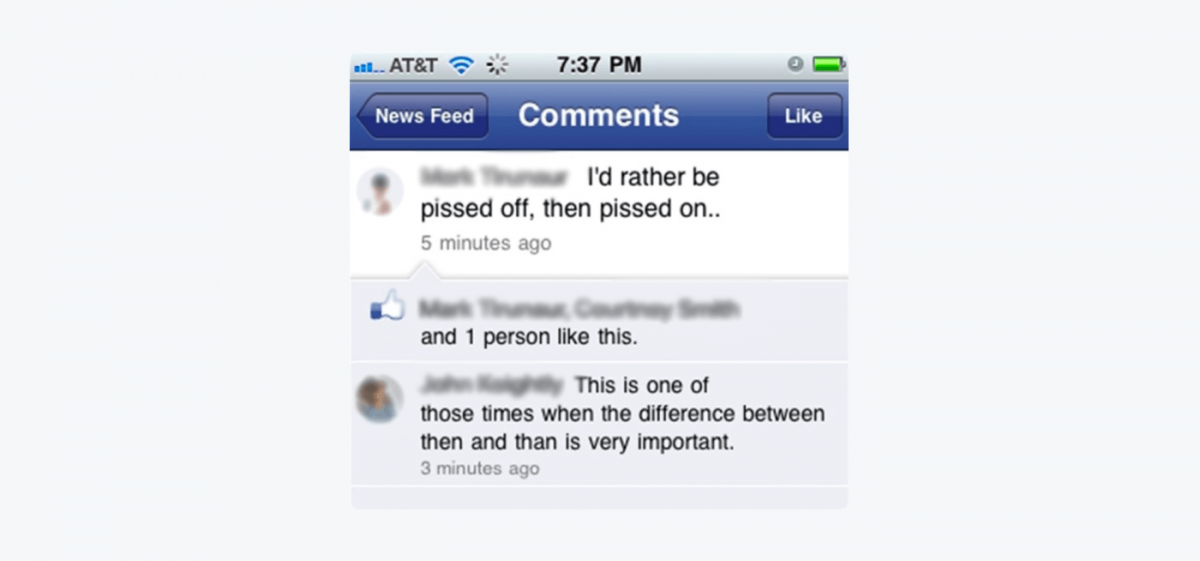
Out of all respondents, 56.9% said that there is something wrong with the sample text, and 90.03% of them spotted the actual mistake. In this group, 66.24% found it irritating, but there were not so many strong opinions about people who would make such a mistake.
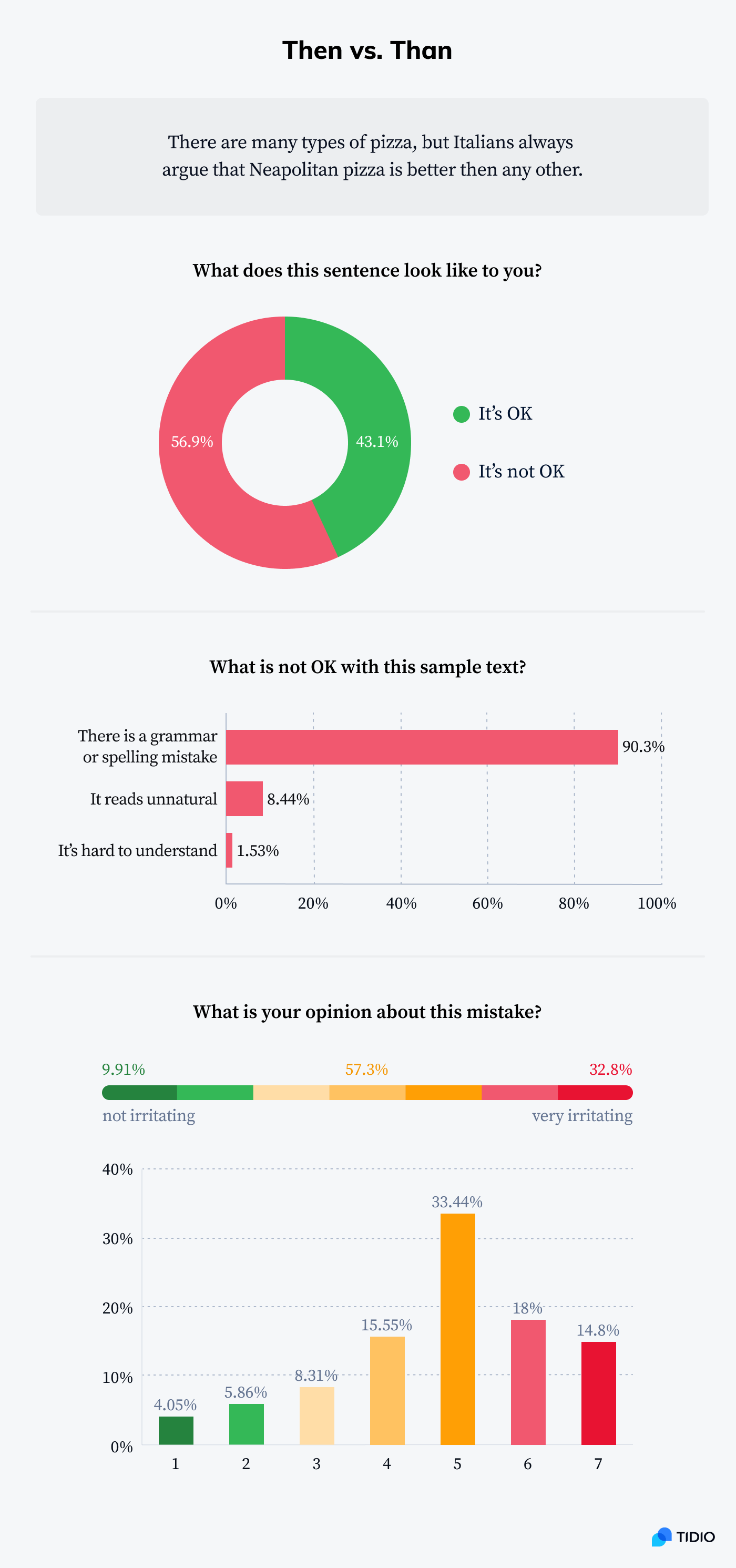
Respondents commented that the person who made this mistake “could be in a rush,” “is simply a human,” or “just made a typo.” The majority admitted that they don’t have a negative opinion about this mistake.
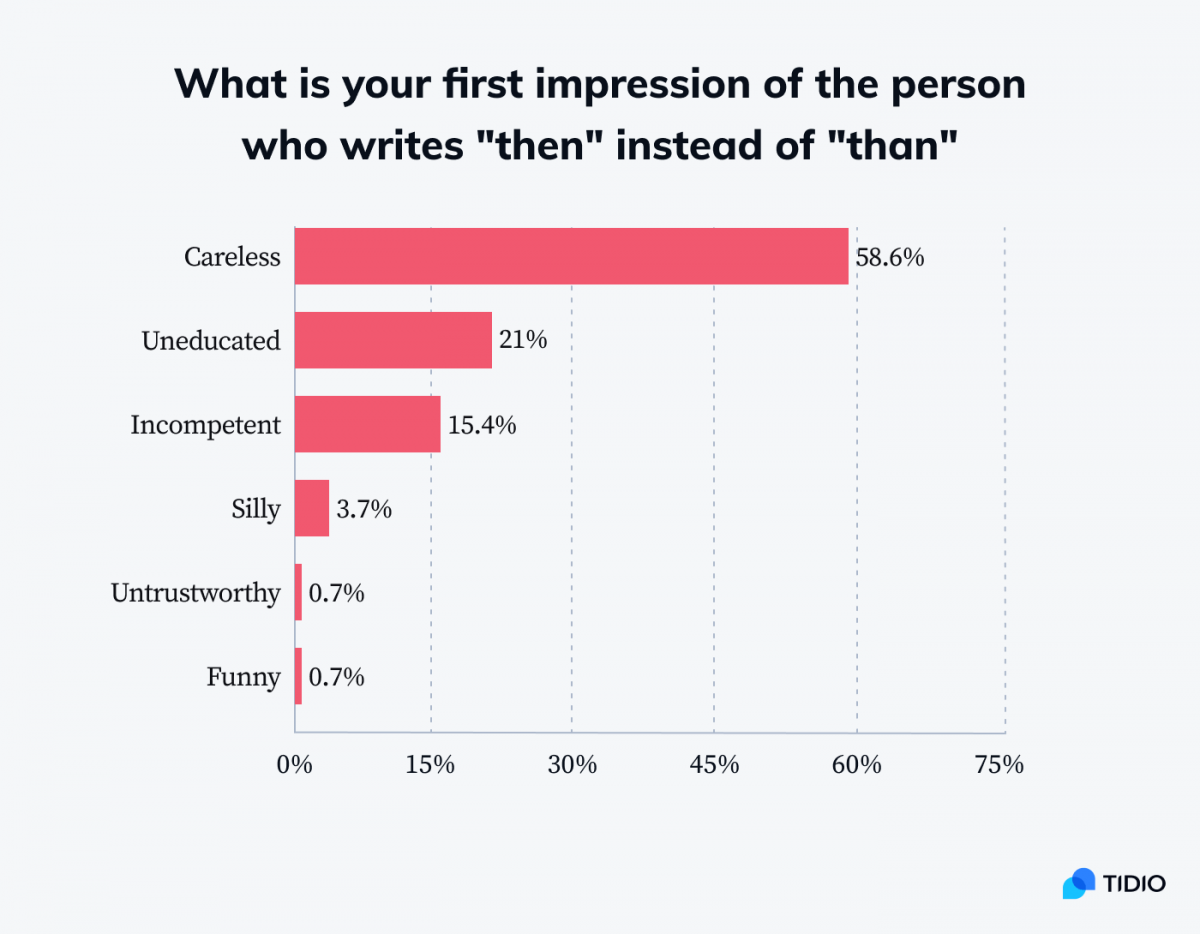
There were some who said “the person sounds like a child” or stated that “grammar isn’t clearly important for the person who writes something like this,” but they were a minority.
#5: Spelling: “ie” vs. “ei” as in “weird”
It’s spelled “weird”, but because of the two vowels after each other, many people spell it as “wierd”, “wird”, or “werd”. Fun fact: it’s one of the most misspelled words in the world, according to Oxford dictionary.

Out of all people surveyed, 64.5% saw something wrong with the sample text, and 90.05% of them could specify it was the misspelled word. Out of this group, 56.28% admitted that this mistake irritates them.
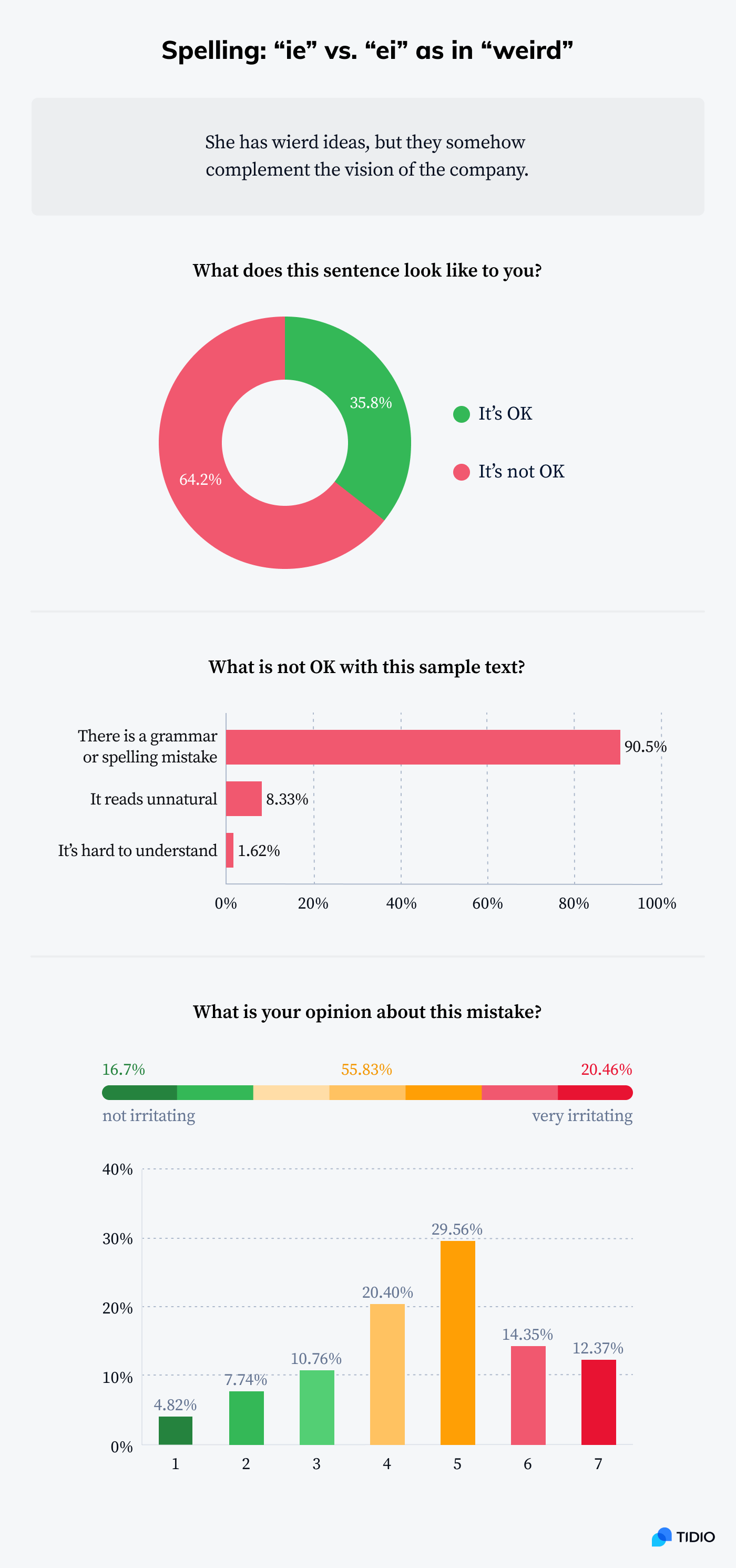
Only 10.4% would find the person to make this mistake “Incompetent,” and 4.6% would lightly judge them as “silly.”
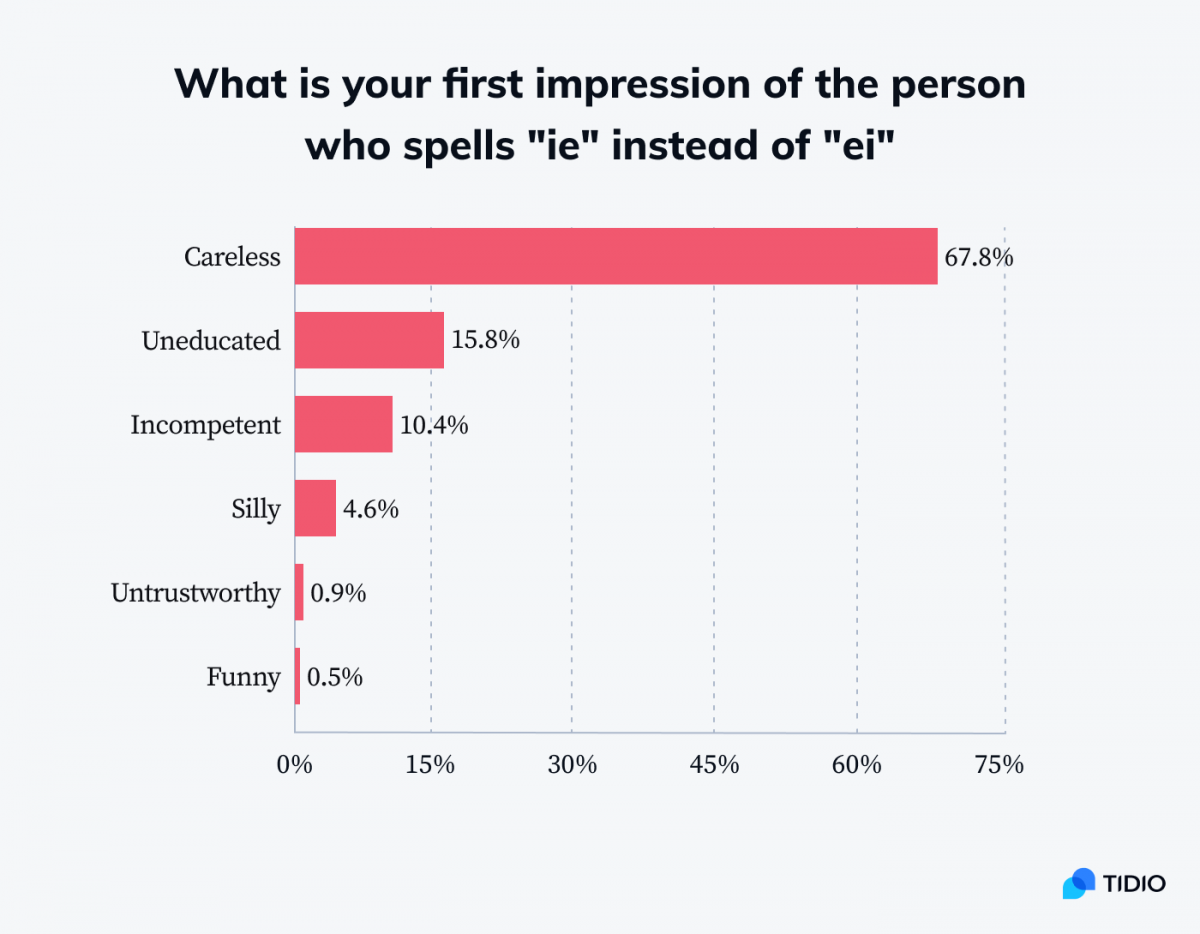
Respondents who wanted to share their own thoughts said that the person “might not be a good speller,” “could be dyslexic,” or “inattentive.”
It seems that spelling mistakes are less irritating to look at.
#6. Spelling: double consonants as in “Millennials” vs. “Millenials”
Misspellings are considered rather minor errors, and it is said they can happen to the most vigilant grammar police members. But wait… don’t we all have autocorrect on our phones and computers?
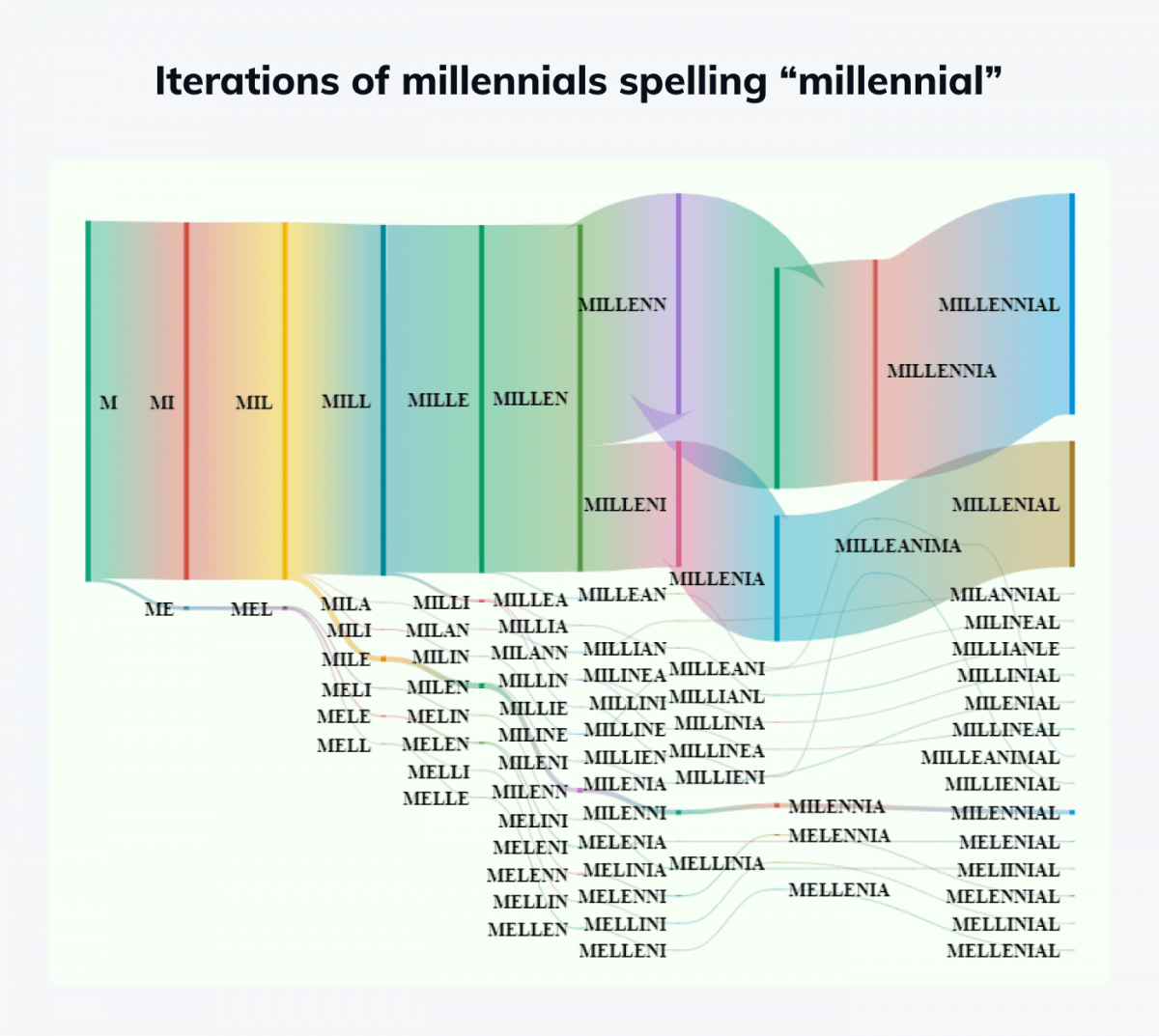
When asked whether there is something wrong with the sample text, 57.3% said that the text is not OK. Out of this group, 61.25% noticed the misspelling of “Millennials” in the sample text, and 44.88% of them found it annoying.
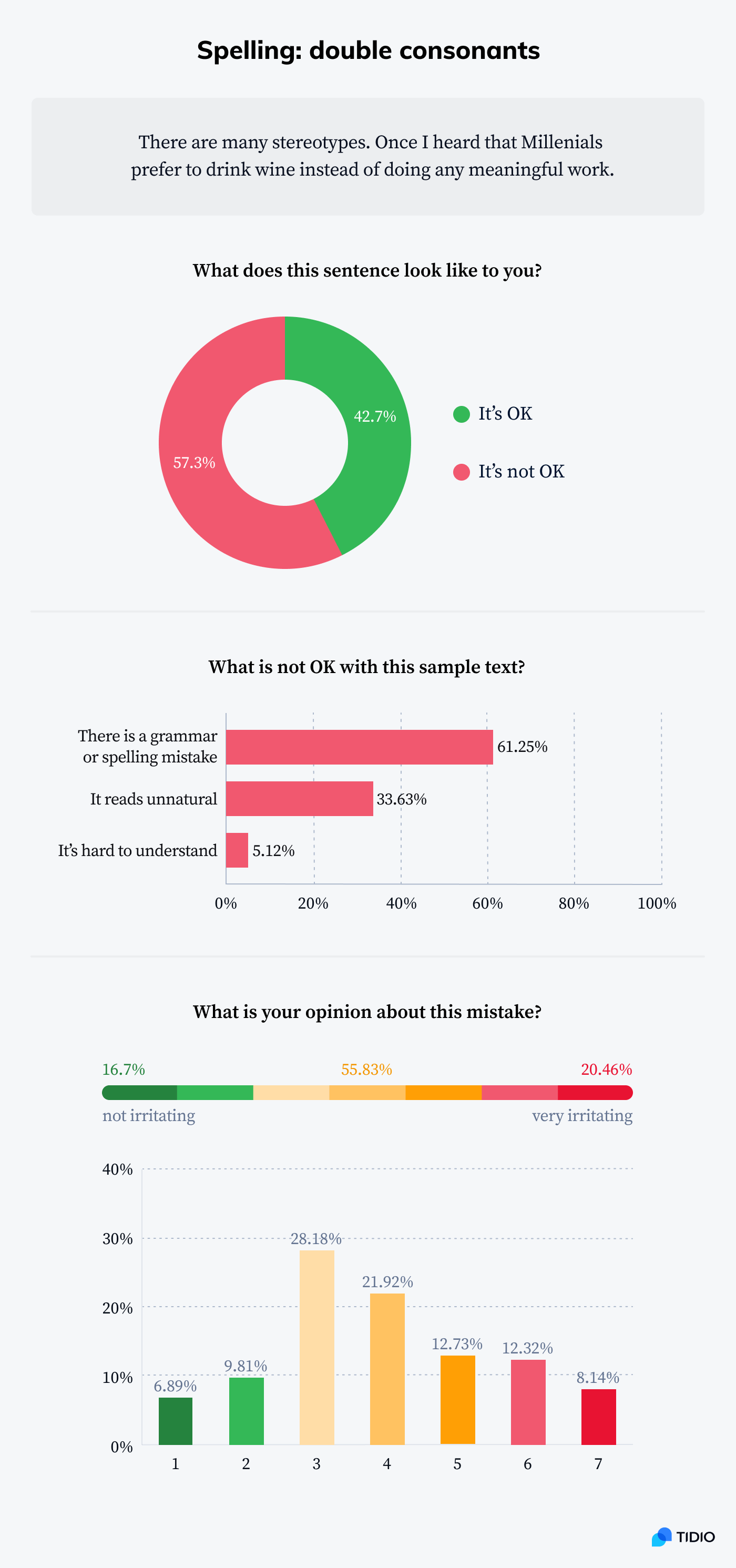
As many as 59.6% of surveyed Millennials noticed something wrong with the sample text, and 65.9% of them spotted the misspelled “Millennials” word.
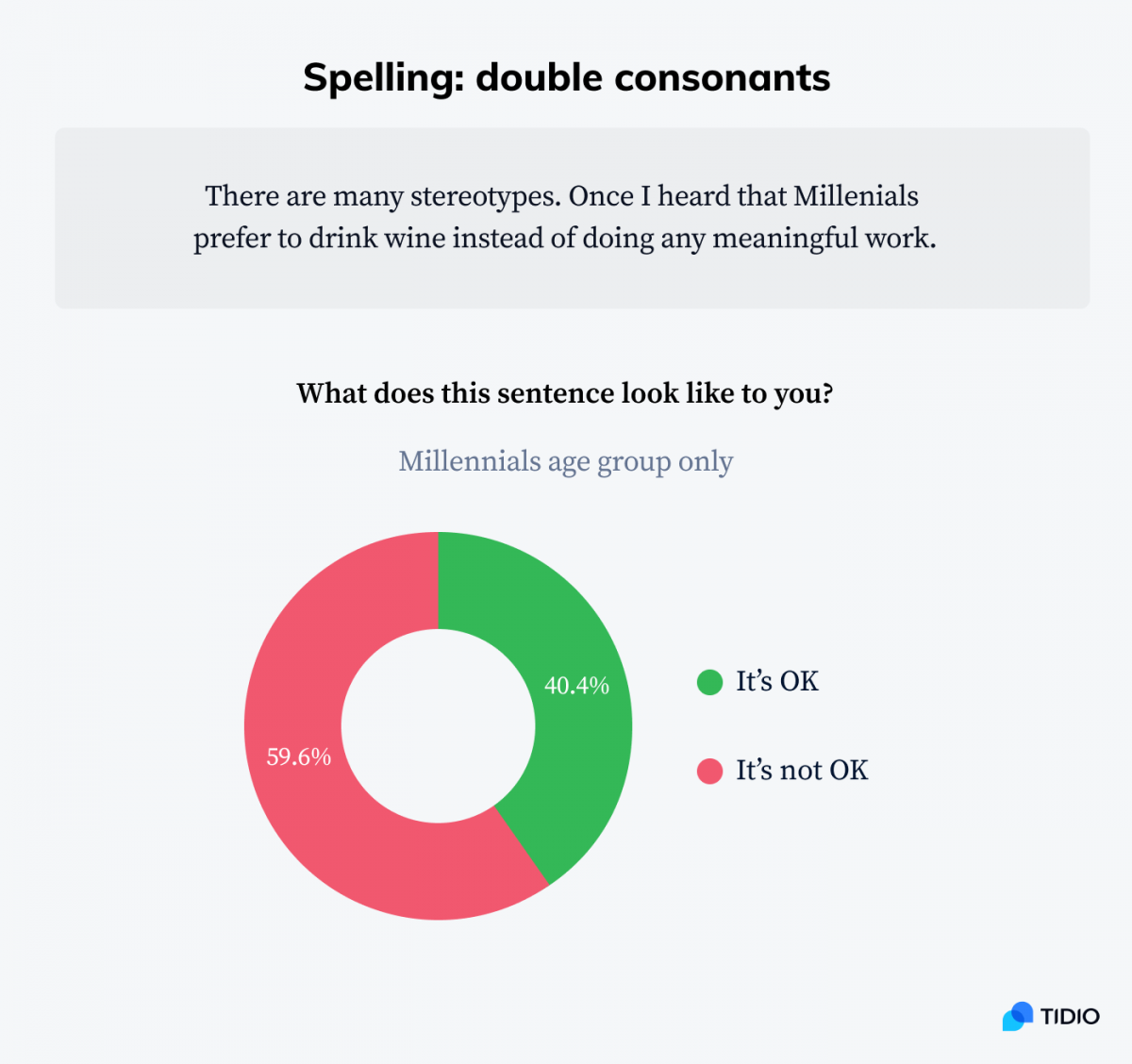
The misspelled word didn’t get much hate, and some people didn’t even notice this mistake but rather noticed others, like a missing or misplaced comma in the sample text.
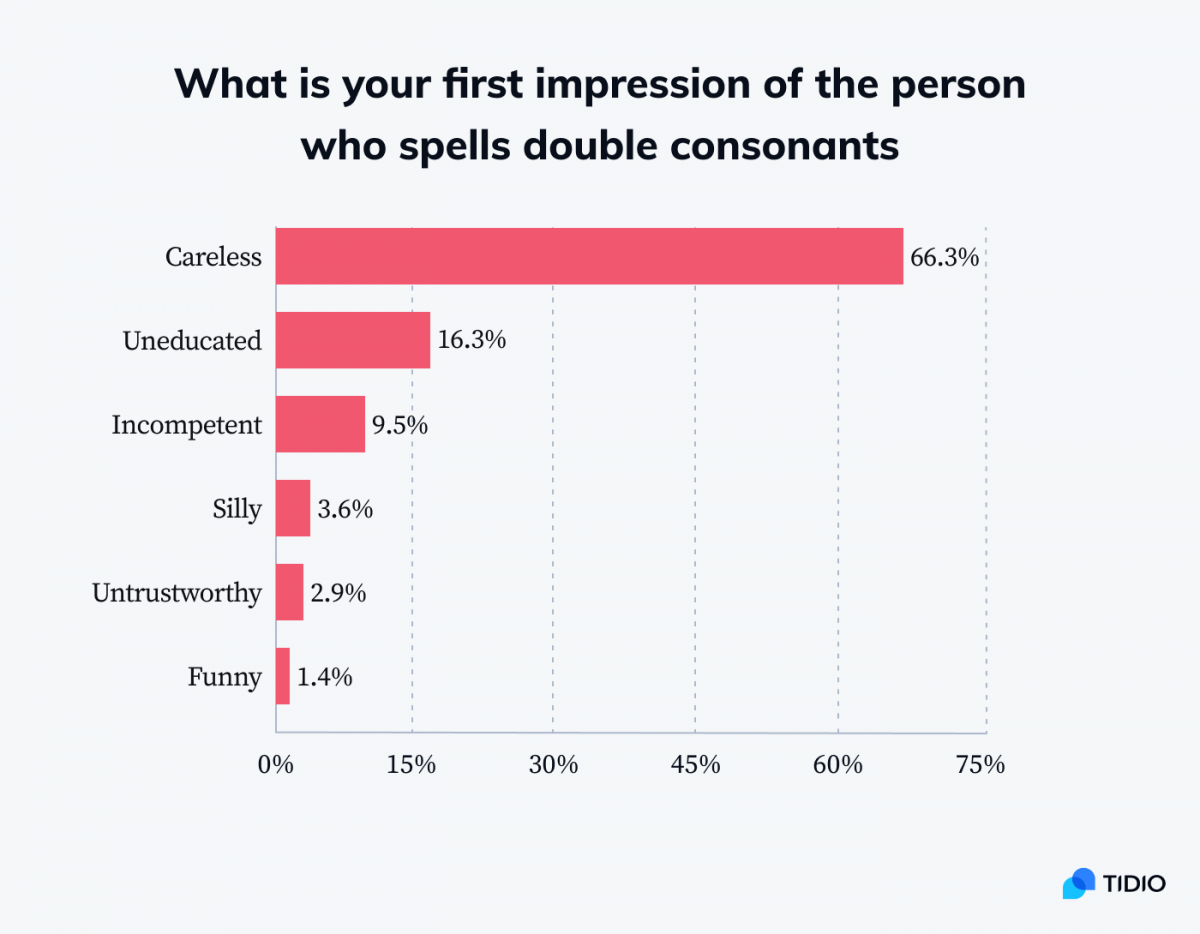
#7: Misplaced commas
Different languages have different rules about how to use commas, but in English, putting a comma before “that” in a subordinate clause position is a very common mistake.

That’s why I was surprised when I saw that as many as 55.9% of respondents noticed that there is something wrong with the sample text and 67.28% of them identified the mistake.
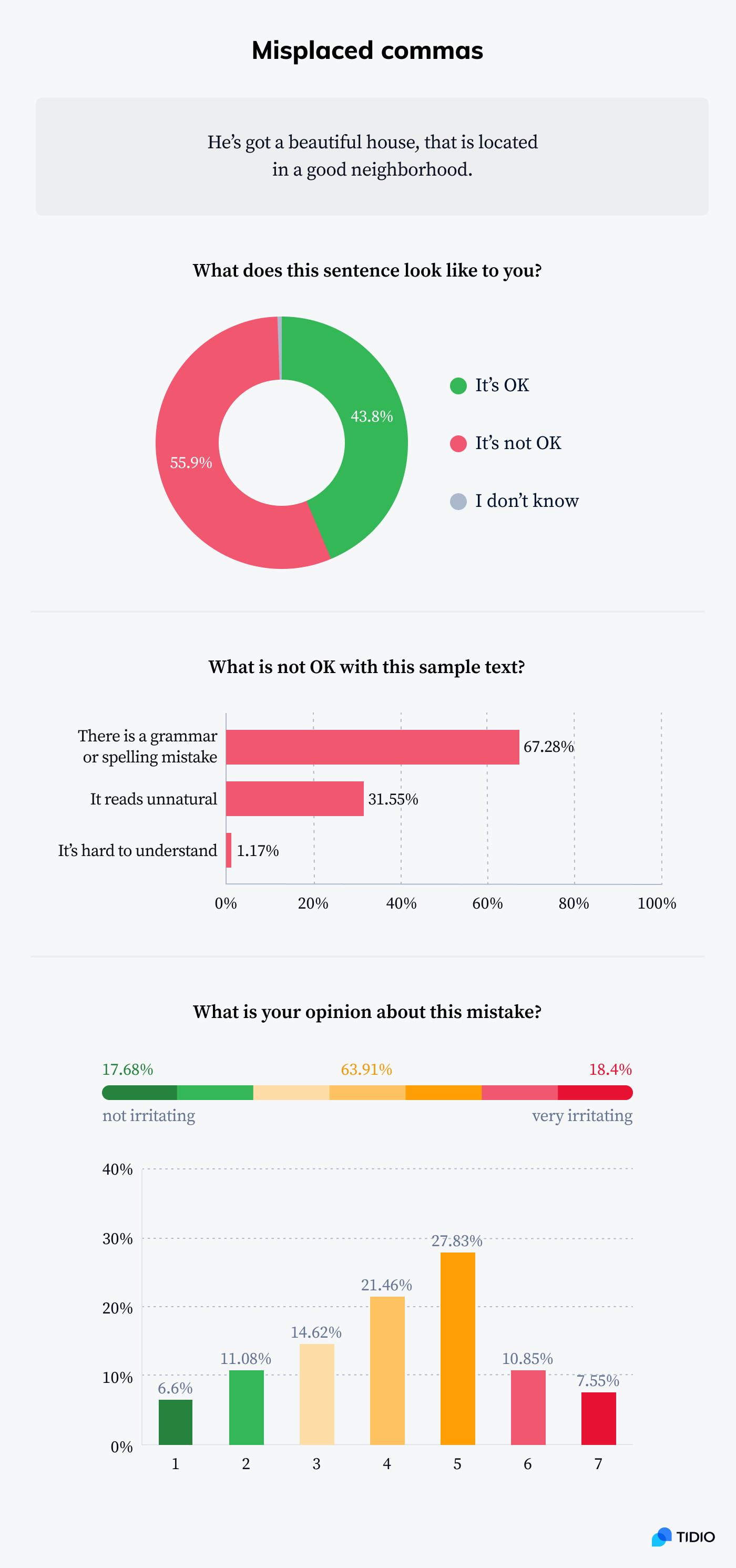
This was until I saw the comments, where people pointed out that the spelling is “American” and they are from the UK or Australia. It turns out that a lot of people thought the spelling of the “neighborhood” was the mistake, not the comma before “that” in a sentence. ¯\_(ツ)_/¯
Those who actually identified the mistake we intended them to, said that “It’s just a comma where there shouldn’t be one. I wouldn’t go as far to say uneducated for something as little as that” and that they have “No opinion because people misplace commas all the time.”
#8: Pet peeve: grammatically correct, but strange-sounding phrases
To make things a bit more interesting, we included this sample text that is grammatically correct, but sounds strange or confusing. We also treated this question as an experiment, not counting it in the final results.

Only 47.5% of respondents admitted that the text sample is fine, but 60.56% of those, who said it’s not, said that it reads unnaturally.
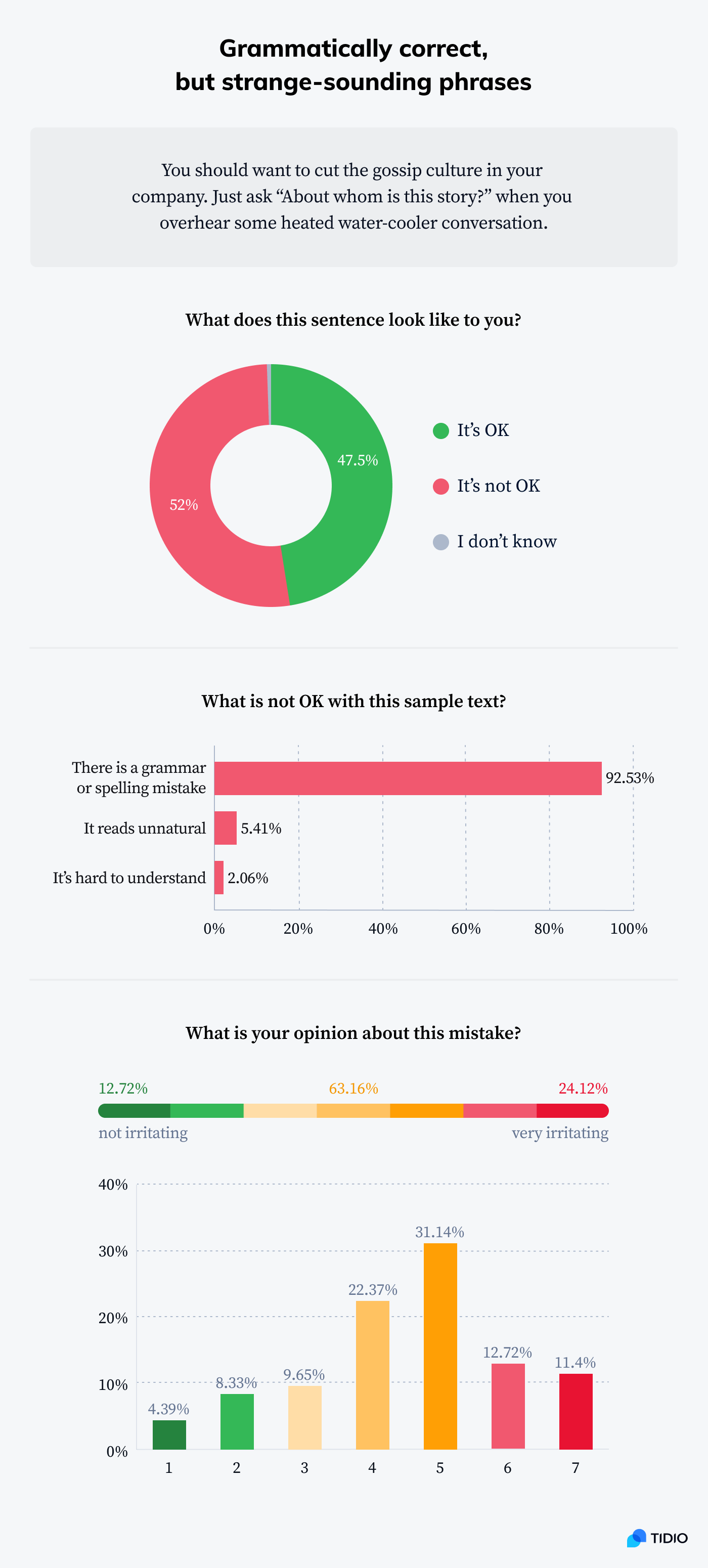
Those who identified the sentence as grammatically incorrect said that the person who would say something like this is “Pretentious,” “Arrogant,” and “Trying too hard.”
Now, you may wonder… How well our grammatically conscious respondents did in the test?
Grammar drama survey: results
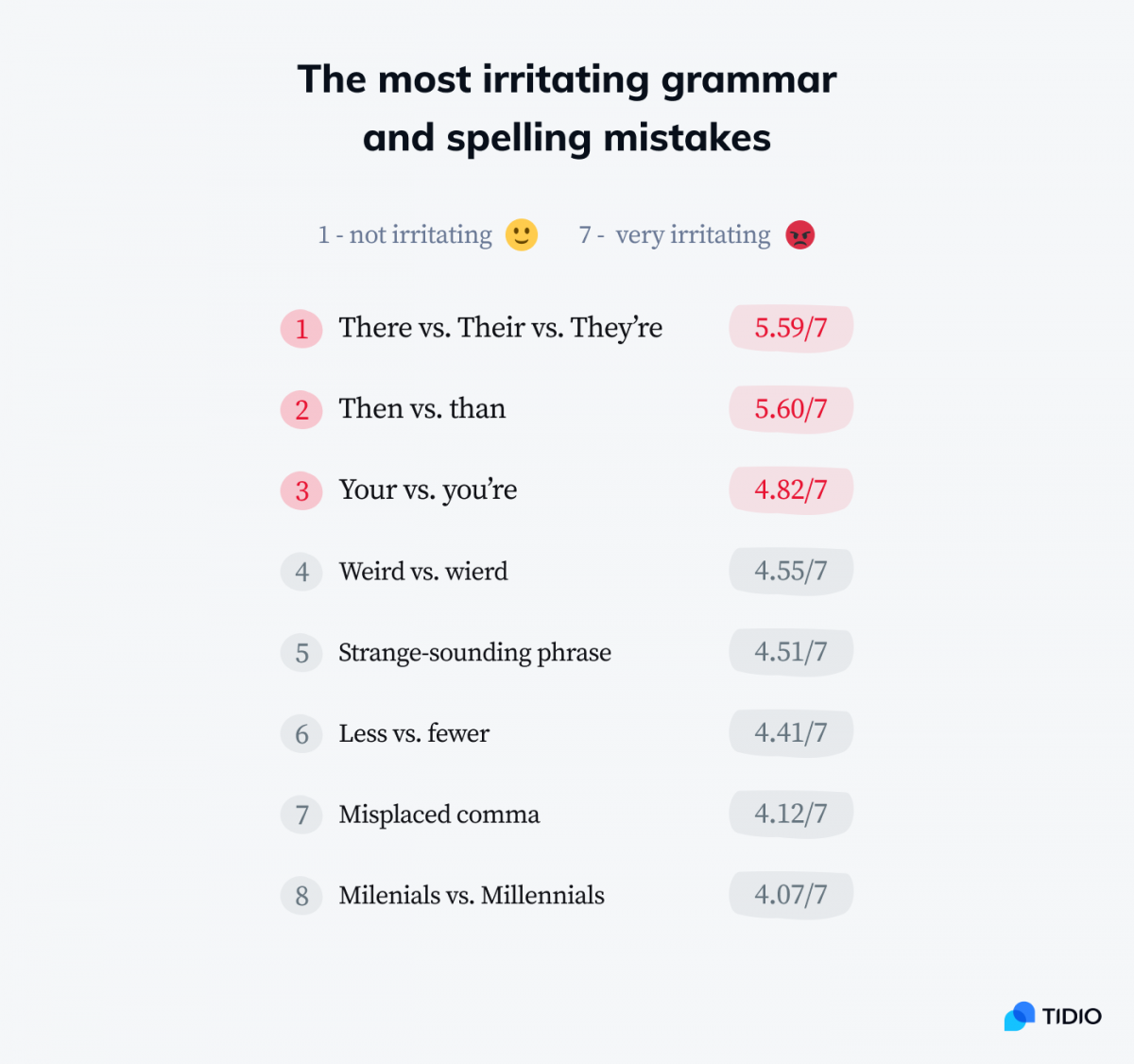
Out of 1,700 people who admitted they consider themselves attentive to grammar when reading content online, only 2.8% scored 7/7 in our survey. The majority, namely 29.94%, scored 5/7 and 3.7% scored 0/7.
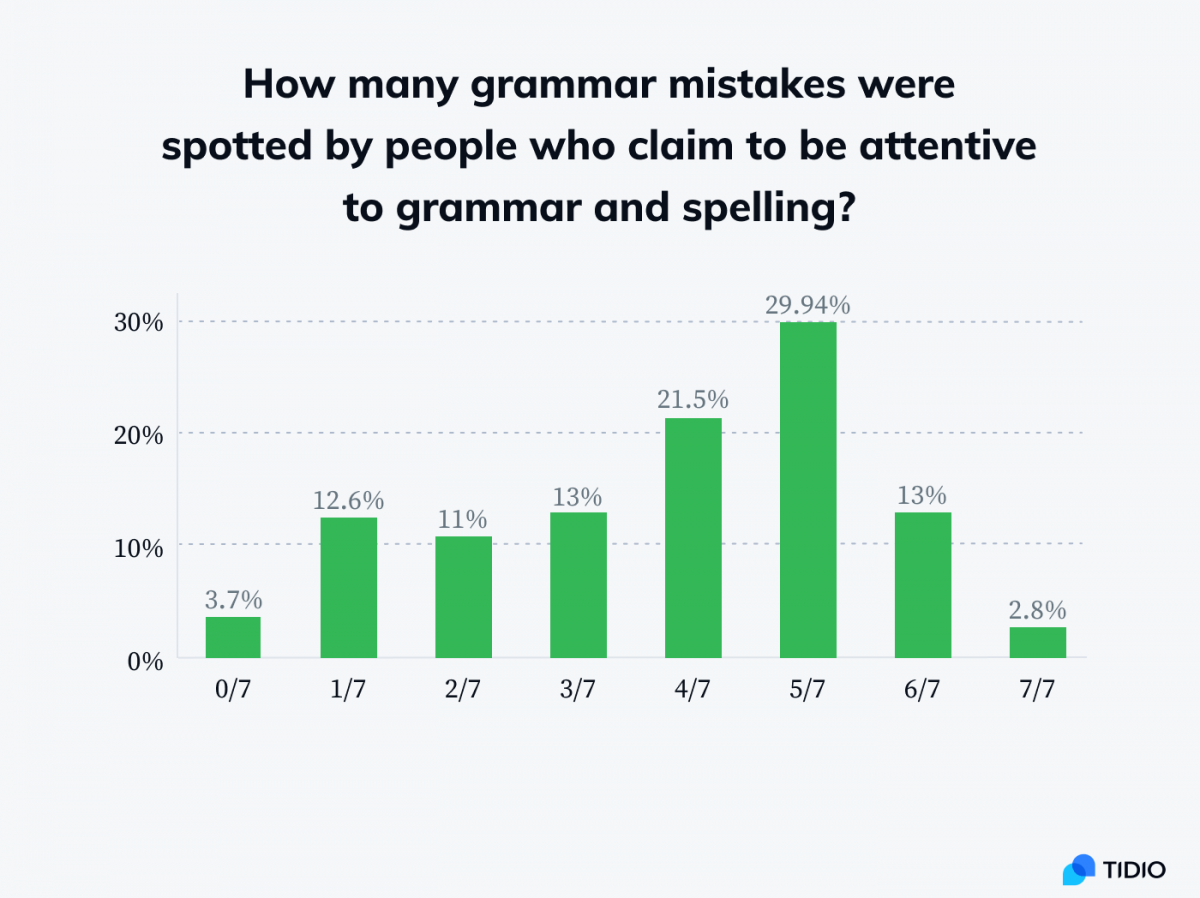
Only 2.8% of grammatically conscious Millennials scored 7/7, but they still did better than Baby Boomers (2.45% scored 7/7) and Gen-Zers (2.7% scored 7/7).
Grammar drama: conclusions
It’s doubtful that correct usage of grammar directly correlates with a person’s level of intelligence. However, this bias is still present, especially in the professional world.
Proper grammar usage will make you look more attentive and thorough, which may be especially important for a company’s image and reputation.
While the English language evolves, and more people understand that a splice comma can happen, it’s safer to avoid the most irritating mistakes. After all, let’s all bear in mind that communication remains vital, even more so in the digital space.
Bonus: grammar can really cause some drama
While putting the survey together, I used the “It reads unnatural” sentence as one of the answers, even though using an adverb instead of an adjective could be acceptable only in casual, spoken American English.
The correct sentence, in this case, should be “It reads unnaturally.” I also didn’t add a comma in one of the text samples.
Oh, the irony!
The respondents from Reddit were quick to correct me:

Thank you! Learning from your own mistakes is the best kind of learning 👌🏻
Methodology:
We collected answers from 1839 respondents. We used Amazon’s Mechanical Turk and Reddit.
Respondents were 53.9% females, 40.02% males, and 1.74% declaring as non-binary.
Respondents had to answer four demographic questions and rate eight samples of text.
Out of 8 samples, 7 contained a grammatical error or a spelling mistake, and one sample was grammatically correct, but its structure read unnaturally—this question was not included in the final score (hence, every person who got a 7/8 score, scored a 7/7 in reality).
Next, we asked them to identify whether the text is OK, or there is something wrong with it. If the respondent thought that the sample is fine, they were redirected straight to the next text sample.
If the respondent identified that there is something wrong with the text sample, they were showed a follow-up question asking them whether the sample text:
- Has a grammar mistake or spelling error
- Reads unnaturally
- Is hard to understand
Only those who confirmed that the text contains a grammar or spelling mistake could rate how irritating the mistake is and how they would perceive the person making this mistake.
The final score was calculated based on how many mistakes a respondent managed to spot.
Fair Use Statement:
Are you surprised by the results of our study about grammar? Feel free to share statistics, just remember to mention the source and include a link to this page. Thank you!
Sources mentioned in the article:
- The Professional Importance of Grammar and How it Should be Taught by Nicole Frederick
- Personality Influences Reactions to Written Errors in Email Messages by Julie E. Boland and Robin Queen
- Does Grammar Matter? by Andrea S. Calude
- Language and thought: Does grammar make us smart? by Paul Bloom
- How Do New Words Enter the Dictionary? report by Druide
- Quickly Type The Shrug Emoji ¯\_(ツ)_/¯ by Oleksii Kovalenko
- The Most Common English Misspellings by Oxford Dictionary

